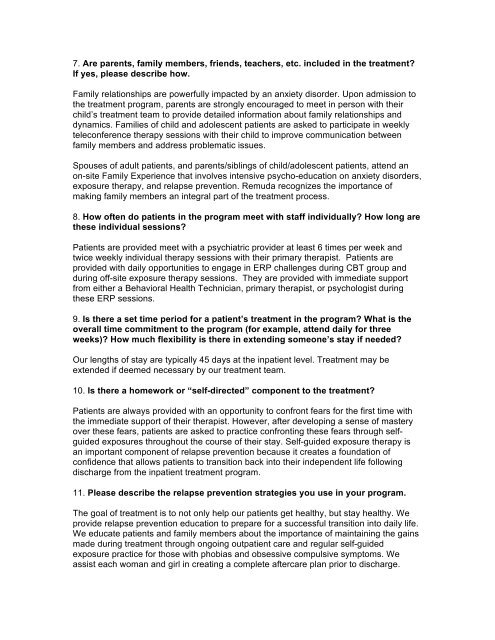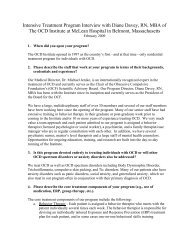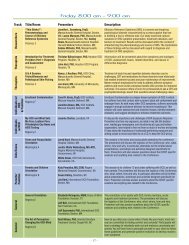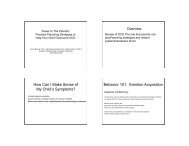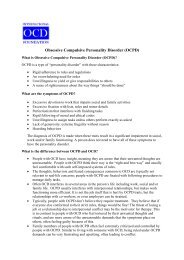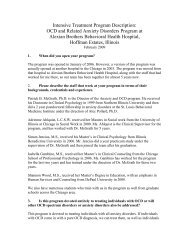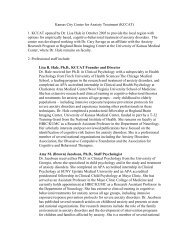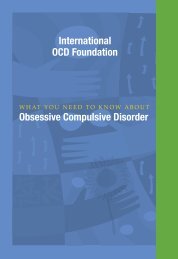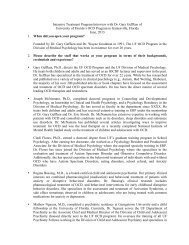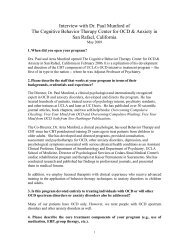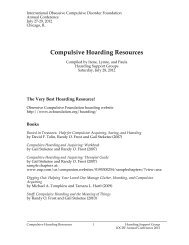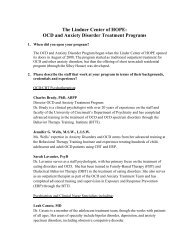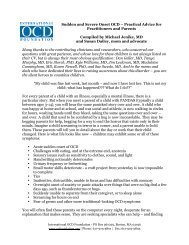When Did You Open Your Program? - Obsessive-Compulsive ...
When Did You Open Your Program? - Obsessive-Compulsive ...
When Did You Open Your Program? - Obsessive-Compulsive ...
Create successful ePaper yourself
Turn your PDF publications into a flip-book with our unique Google optimized e-Paper software.
7. Are parents, family members, friends, teachers, etc. included in the treatment<br />
If yes, please describe how.<br />
Family relationships are powerfully impacted by an anxiety disorder. Upon admission to<br />
the treatment program, parents are strongly encouraged to meet in person with their<br />
child’s treatment team to provide detailed information about family relationships and<br />
dynamics. Families of child and adolescent patients are asked to participate in weekly<br />
teleconference therapy sessions with their child to improve communication between<br />
family members and address problematic issues.<br />
Spouses of adult patients, and parents/siblings of child/adolescent patients, attend an<br />
on-site Family Experience that involves intensive psycho-education on anxiety disorders,<br />
exposure therapy, and relapse prevention. Remuda recognizes the importance of<br />
making family members an integral part of the treatment process.<br />
8. How often do patients in the program meet with staff individually How long are<br />
these individual sessions<br />
Patients are provided meet with a psychiatric provider at least 6 times per week and<br />
twice weekly individual therapy sessions with their primary therapist. Patients are<br />
provided with daily opportunities to engage in ERP challenges during CBT group and<br />
during off-site exposure therapy sessions. They are provided with immediate support<br />
from either a Behavioral Health Technician, primary therapist, or psychologist during<br />
these ERP sessions.<br />
9. Is there a set time period for a patient’s treatment in the program What is the<br />
overall time commitment to the program (for example, attend daily for three<br />
weeks) How much flexibility is there in extending someone’s stay if needed<br />
Our lengths of stay are typically 45 days at the inpatient level. Treatment may be<br />
extended if deemed necessary by our treatment team.<br />
10. Is there a homework or “self-directed” component to the treatment<br />
Patients are always provided with an opportunity to confront fears for the first time with<br />
the immediate support of their therapist. However, after developing a sense of mastery<br />
over these fears, patients are asked to practice confronting these fears through selfguided<br />
exposures throughout the course of their stay. Self-guided exposure therapy is<br />
an important component of relapse prevention because it creates a foundation of<br />
confidence that allows patients to transition back into their independent life following<br />
discharge from the inpatient treatment program.<br />
11. Please describe the relapse prevention strategies you use in your program.<br />
The goal of treatment is to not only help our patients get healthy, but stay healthy. We<br />
provide relapse prevention education to prepare for a successful transition into daily life.<br />
We educate patients and family members about the importance of maintaining the gains<br />
made during treatment through ongoing outpatient care and regular self-guided<br />
exposure practice for those with phobias and obsessive compulsive symptoms. We<br />
assist each woman and girl in creating a complete aftercare plan prior to discharge.


